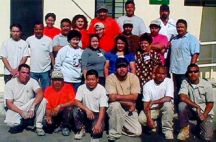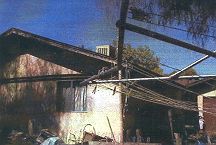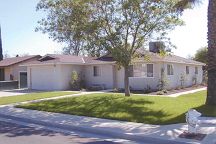2000 Best Practice Awards
"Local" Winners: Fresno, California
2000-1609 Firm Build
Merced, California
Contact: Nick Benjamin (209) 722-3501
FIRM BUILD was developed with two distinct
goals in mind. First to promote  individual
self sufficiency and second to assist in the campaign of welfare to work.
FIRM BUILD participants are public housing and Section 8 residents looking
to learn a job skill. Residents work on a wide variety of HA modernization
and repair projects. The program is a self paced, work first process that
includes extensive on the job training supplemented by some basic classroom
instruction.
individual
self sufficiency and second to assist in the campaign of welfare to work.
FIRM BUILD participants are public housing and Section 8 residents looking
to learn a job skill. Residents work on a wide variety of HA modernization
and repair projects. The program is a self paced, work first process that
includes extensive on the job training supplemented by some basic classroom
instruction.
2000-788 Southeast Asian Crime Prevention
Visalia, California
Contact: Paul Chao (559) 738-3224
Southeast Asian (Hmong, Lahu, Lao, and Mien)
refugees experience many language and cultural barriers which prevent them
from fully understanding law enforcement issues. In their home country,
law enforcement agencies were perceived as a oppressive force of government,
full of corruption. Trust became an issue that divided the government and
it's people. Refugees in the United States, particularly in the City of
Visalia, in rural Tulare County, California, do not utilize law enforcement
services because available services are not linguistically accessible to
the needs of a limited English-proficient population. The Southeast Asian
Crime Prevention grant will be used to provide community education in the
areas of law enforcement, the judicial system, and after school programs.
2000-1651 Moving to Work Program
Visalia, California
Contact: Tim Sciacqua (559) 627-3700
Moving to Work is an innovative program,
operated by the Tulare County Housing Authority, which provides families
living in public housing, receiving Section 8 rental assistance, or receiving
public assistance with the opportunity to save money, receive financial
incentives for finding employment, and, eventually, purchase their own
home. With help from local job training services, families in the Moving
to Work program participate in education, employment, and training programs,
with the goal of finding employment.
2000-1868 Villa de Guadalupe
Visalia, California
Contact: Peter Carey (559) 651-1000
Villa de Guadalupe will be a major new housing
and medical center for the desperately poor farm worker communities of
Cutler and Orosi. Working together in a model partnership, two of the region's
leading non-profit organizations are bringing into reality an answer to
long-recognized community needs. Self-Help Enterprises (SHE), one of the
nation's foremost rural community development organizations, and Family
HealthCare Network will join together in construction and operation of
60 units of affordable rental housing targeted to the vast unmet farm worker
housing need, and a primary care health clinic. Unique to the project is
the direct involvement of a local community task force in the development
of the concept and the direct long-term involvement of local farm workers
in management and operation of the project. The original initiative for
the project came from the local task force, and the project name itself,
which symbolizes hope, was chosen by community members.
2000-1894 Hmong Agricultural Economic Development Project
Fresno, California
Contact: Pheng Lee (559) 237-4919
The Hmong are an agrarian tribal people from
the mountains of Laos. During the Vietnam War, the Hmong and other Laotian
tribes protected United States interests by defending the Ho Chi Minh Trail
against the North Vietnamese forces. After Laos fell to communism in 1975,
the Hmong were targeted for reprisals by the Laotian and Vietnamese governments
for their support of American interests during the Vietnam War. To escape
Laos, thousands of Hmong fled their home country, through the jungle and
across the Mekong River to live as refugees in Thailand. Since the late
1970s, more than 150,000 Hmong refugees have resettled in the United States.
An estimated 60,000 Hmong live in California's San Joaquin Valley, the
largest concentration of Hmong outside of Asia. Since they were primarily
farmers in their home country, the Hmong were drawn to Fresno and other
counties in California's San Joaquin Valley because of the availability
of farmland and agricultural opportunities. The Hmong have not made significant
economic progress, however, after twenty years in Fresno County. Today,
the majority of Hmong are still in farming and struggling, and approximately
60% still rely on public assistance as a mean to support their family.
The Hmong agricultural economic development
project provides economic empowerment to the underserved Hmong farming
community. This project, an agricultural co-operative, provides Hmong farmers
with the capital, technical, and financial support necessary for a successful
farming operation. Through partnerships with local resources, Hmong farmers
can now receive information on farm loans, pest control, crop production,
harvesting techniques, marketing, and running a successful farm operation.
2000-2210 Neighborhood Networks Center - The Winery
San Rafael, California
Contact: Nathan Stairs (559) 453-1504
The Winery Apartments is a 248 unit multifamily
project located in Southeast Fresno which is a poor, high unemployment,
high crime, high vacancy area. The Winery Apartments Computer/Crafts Learning
Center was opened in October, 1997 as a part of a comprehensive rehabilitation
process. Using operating funds and funds provided by the Bank of America,
as well as two volunteers from a faith-based organization, the Computer/Craft
Learning Center was started. Because of the socio-economic problems in
its community, the non-profit owner Ecumenical Association for Housing
(EAH) realized that it would need partners and community support. The United
Way of Fresno County became a partner by choosing the Wineryas a "Weed
& Seed" safe haven site. The Weed & Seed program has funded
the NNWs at a rate of $7,600 per year for four years, which is used for
operating the computer/crafts programs.
Most recently, the U.S. Department of Justice
"Weed & Seed Program awarded the Winery a $50,000 "Seedtech"
Grant—one of only three grants given out this year in the entire country.
2000-2923 Fresno County Downpayment Assistance Program
Fresno, California
Contact: Gigi Gibbs (559) 262-4266
The Downpayment Assistance Program provides
low and moderate income families with a $1,000 to $4,000 zero interest,
deferred payment loan to cover portions of a downpayment for a new or used
home. The money can also be used to pay closing costs, loan points, home
inspections, and home warranties.
2000-2984 Growing Jobs
Fresno, California
Contact: Toulu Thao (559) 487-5033
Growing jobs is a unique collaborative between
HUD, the American Farmland Trust (AFT) and the local farming community
in Fresno that will serve the Hmong population that began migrating to
Fresno from Laos in the late 1970’s. While the Hmong were farmers
in their homeland (Laos in Southeast Asia), they have had difficulty finding
land to farm in the Central Valley of California. Lack of access to land
and credit has limited this populations ability to farm. The Growing Jobs
collaboration has purchased a 40-acre plot of land (through a land trust
with the American Farmland Trust). This plot of land, which was threatened
with development, will be preserved as open space and farmland in perpetuity.
The Hmong population will be able to use this land to cultivate crops such
as strawberries, bitter melon and other traditional Asian produce. The
land trust will serve the dual objective of farmland preservation and economic
development through increased employment and income for the Hmong population
in Fresno.
2000-3063 Latino Marketplace Homeownership and Social Services Fair
Fresno, California
Contact: Lidia Mena-Hermida (559) 487-5033
The Housing and Social Services fair is being
held June 10, 2000 and is targeted to the large Latino population that
resides in the Fresno area. The event will provide information and resources
on homeownership, housing, health services, social services, and other
issues. The fair is being held downtown at the Mercado Latino (the Latin
Marketplace) which includes a collection of about 40 shops and stores that
sell Latino merchandise and cuisine. Attendance is expected to be more
than 1,000.
2000-3067 Time of Sale Energy Renovation (TOSER) Program
Fresno, California
Contact: Jim Staples (559) 487-5100
The Staples-Hutchinson Time of Sale Energy
Renovation (TOSER) Program is designed to transform the homebuying process
to include energy efficiency as a prime consideration. The goal is to motivate
the homebuying, refinancing and, eventually, the home-building markets
to use an Energy Efficient Mortgage (EEM) to meet or ensure standards for
home energy efficiency. To achieve this transformation, TOSER's public
education and information activities focus on three principle players:
homebuyers, real estate agents and mortgage lenders.
2000-3078 Self-Sufficiency Children's Activities
Fresno, California
Contact: Ned Stacy (559) 443-6400
Self-Sufficiency Children's Activities are
sponsored by the Fresno City and County Housing Authority's Self-Sufficiency
Program. It is aimed at children who live in public housing whose families
may not have money to pay for music lessons, after school programs, scouting
troops, and other childhood activities. The Fresno City and County Housing
Authority provides two unique activities: a children's performing arts
troupe, and scouting activities, for children living in the Housing Authority's
projects.
2000-3117 The Californian
Fresno, California
Contact: Christy D. Baker (559) 485-8190
The Californian is a seventy five year old
high rise building in the heart of downtown Fresno, California. Surrounded
by boarded up buildings, abandoned storefronts, and a deteriorating downtown,
the Californian is one of Fresno's most beautiful old buildings. The facility
was remodeled in 1973 to provide 217 Single Room Occupancy (SRO) housing
units for low income seniors and the disabled. It provides a program of
gentle support that enables residents to maintain optimum health and an
independent lifestyle. Programs emphasize and promote nutrition, mental
health, physical health, social activities, life skills, security, and
acceptance. This project is operated by AIMCO, whose mission is to provide
dignified, comfortable housing for low income seniors and the disabled.
Through networking with non-profit and government agencies, The Californian
has been able to provide a safety net of services for tenants who need
assistance.
2000-514 Hmong Homeownership Video
Fresno, California
Contact: Toulu Thao (559) 487-5033
The Fresno HUD office, located in California's
San Joaquin Valley, homeownership and housing services to the largest population
of Hmong outside of Asia. According to some estimates, nearly 60% of the
Hmong in the San Joaquin Valley receive some form of public assistance.
This inability to achieve economic independence has affected the Hmong's
abilities to achieve the American dream of homeownership. This issue is
further compounded by confusion about credit and the homeownership process.
Experts who study the Hmong estimate that only 10% of Hmong families in
the San Joaquin Valley own a home.
In an effort to address issues that have
prevented the Hmong from buying homes, and to improve the homeownership
rate, staff from the Fresno Area HUD office designed, developed, and produced
a Hmong Homeownership Video. This innovative project is the first of its
kind in California, and a significant resource for the Hmong community,
which helped write, narrate, and produce the video. The actors are in this
video are local Hmong leaders, and the dialogue is spoken in Hmong, with
Hmong voiceovers for the sections with English speaking actors. The video
shows Hmong families going through all the steps of purchasing a home.
It makes a particular effort to clear up confusion in the Hmong community
about credit. This video was developed, written, and produced with support
and technical assistance from both the Hmong community and the local real
estate industry.
2000-1848 Visalia Fox Theatre Renovation
Visalia, California
Contact: Steven Salomon (559) 738-3312
In 1996 the Visalia Fox Theatre, after over
65 years of venerable service to the City of Visalia as a cultural and
social meeting place and structural landmark in the community closed. Although
the theater was designed as an elegant movie palace in the late 1920's,
it had been converted to a cinema triplex which hid many of its glorious
details. The theater sat vacant for months while rain, lack of use, and
overall deferred maintenance inflicted its toll on this important cultural
and historical landmark.
In that same year a group of interested citizens
armed only with their good intentions and belief that important historical
and cultural venues should be preserved for the benefit of the community
decided to form the Visalian Friends of the Fox, a private non-profit organization
whose purpose was to: (1) To acquire through purchase the Fox Theatre located
in downtown Visalia at 300 West Main Street, Visalia; (2) To restore the
Fox Theatre to its original state, maintaining the historical setting and
design; (3) To operate the Fox Theatre as a viable home for the visual
and performing arts; and, (4) To make the theatre available for use without
discrimination to any group, individual, or organization, subject to the
normal and customary costs and availability.
2000-2267 Kings County Foster Youth Transitional Housing Program
Hanford, California
Contact: Donna C. Puckett (559) 582-2806
The Kings County Foster Youth Transitional
Housing Program provides an affordable  residence and supportive services to young adults
who have "aged out" of the foster care system. Goals of the program
include adequately preparing the young adults to be self-sufficient, preventing
homelessness, and preventing teenage pregnancy. Services provided to the
residents include job training/employment
residence and supportive services to young adults
who have "aged out" of the foster care system. Goals of the program
include adequately preparing the young adults to be self-sufficient, preventing
homelessness, and preventing teenage pregnancy. Services provided to the
residents include job training/employment  guidance,
assistance with educational opportunities, health education, tutoring in
life skills such as budgeting and meal preparation, assistance with transportation,
and mentoring. Housing and services are available until a resident is 21
years old.
guidance,
assistance with educational opportunities, health education, tutoring in
life skills such as budgeting and meal preparation, assistance with transportation,
and mentoring. Housing and services are available until a resident is 21
years old.
2000-2810 Clovis, Magill Heights Housing
Project
Fresno, California
Contact: Ron Leinio (559) 242-4292
The purpose of the project was to improve
the condition of the Magill Heights neighborhood. The project involved
several funding sources. CDBG funds were used to install full street widths,
a cul-de-sac to three of the four streets, curbs, gutters, storm drainage,
and a sound wall. The Clovis Community Development Agency purchased vacant
property using redevelopment affordable housing funds and CDBG funds for
a housing in-fill project. The County of Fresno provided HOME CHDO funds
as loans to ten low-income, first-time homebuyers through a self-help housing
project. The area is a low/mod area based on a 1995 income survey. The
area covers Herndon/Magill, Phillips/Duke/manila/Sunnyside, and Argyle
Avenues. Phases I, II, and III were completed with CDBG funds.
2000-3070 Administration-CDBG Program Management
Visalia, California
Contact: Steven Solomon (559) 738-3312
The City of Visalia developed a new project/program
management process and tracking system providing a framework for the successful
reduction of the City's CDBG carry forward amount.
2000-3079 Clovis Silver Ridge Section 108 Project
Fresno, California
Contact: Ron Leinio (559) 262-4292
This project involved the creation of 100
apartments for low-income senior citizens. The old Clovis Community Hospital,
located at 88 N. DeWitt Avenue, was left empty when Clovis Community Hospital
moved to its new facility northeast of town. The property housed interim
uses in portions of the buildings for several years after the hospital
vacated. Once the building was permanently vacant it began to fall into
disrepair. With deteriorating property conditions and trespasser problems
that kept the police department busy, the facility had become a slum-blight
on the neighborhood.
In November 1996, the Affordable Housing
Development Corporation (AHDC) expressed an interest in the site and began
discussions with Community Hospitals and the City. As the project began
to evolve through its many stages, it began to emerge as a reality. By
November 1997, the project was approved.